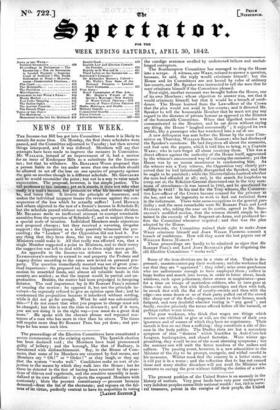Some of the iron-districts are in a state of riot.
Trade is de- pressed; masters cannot pay their workmen; and the workmen find out that they are " oppressed" : they rebel ; seize some gentlemen who are unfortunate enough to have employed them ; collect in large bodies and march into towns, in order to loiter about, break windows, rush upon policemen, throw stones at magistrates—gaze for a time on troops of motionless soldiers, who in turn gaze at them—be shot at, first with blank-cartridges and then with ball, be struck first with the flat of cavalry-swords and then with the edge—see some dozen or so of their party pulled out of the crowd like sheep out of the flock—disperse, return to their homes, much fatigued, and very doubtful whether rioting is "any good"; and finally, receive precisely the terms offered before all the turmoil, or perhaps rather worse terms. The poor workmen, who think that wages are things which masters can withhold or give at will, are the victims of their own ignorance and of causes of which they have no cognizance. Their tumult is less an act than a suffering : they constitute a site of dis- ease in the body politic. The Dudley riots are but a secondary symptom of that "distress" which fructifies in Anti-Corn-law Leagues, bankruptcies, and closed factories. Were winter ap- proaching, they would be one of the most alarming symptoms ; but the summer-sun will melt the fierce resolves of the nailers and colliers. The passing event, however, is a new admonition to the Minister of the day to be prompt, energetic, and withal careful in -his measures. Winter must find the country in a better state, or it will put it in a worse ; and the reflection that he has not caused these and many similar disorders will not avail the Minister who ventures to occupy the post without fulfilling the duties of a ruler.


























